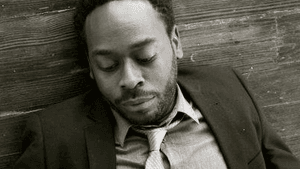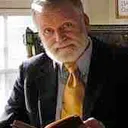Stay in the Loop
BSR publishes on a weekly schedule, with an email newsletter every Wednesday and Thursday morning. There’s no paywall, and subscribing is always free.
“Heart and blood” on the page and stage: interviewing playwright James Ijames

I was hit hard by the The Most Spectacularly Lamentable Trial of Miz Martha Washington — Martha Washington as America has not seen her and her time. A dramatic mirror held right up to the face of America — warts, erasures, distortions, layers of truth, and all.
Others apparently felt the same way, so much so that BSR contributor Jim Rutter wrote in the Inquirer, “James Ijames has crafted a superbly written, emotionally compelling, and morally challenging play. How challenging? About halfway through his 80-minute one-act, I no longer wanted to review it.”
Neither did I. An interview with the playwright seemed the best way to come to terms with this extraordinary drama that will most likely still get performed a hundred years from now.
How did you come up with the subject matter of the dying Martha Washington, surrounded by her slaves, and being both nurtured and brutally confronted, all at the same time?
I was working on a research project called FRoNTiN and watched a documentary called Africans in America, with an entire segment about Martha and George and slavery. I was intrigued by the fact that she freed the slaves before her death, even though George put in his will that they should be freed upon Martha’s death.
Martha Washington seemed a nice lady, albeit the wife of America’s most prominent slave owner at the time. What made you focus specifically on her and put her through nightmarish experiences?
After more research, I found some correspondence between Abigail Adams and a woman named Mary Cranch in which they discussed Martha’s fear that the slaves were going to kill her in order to be freed. I thought this scenario was comedy waiting to happen, and it turns out I was right.
I chose Martha Washington because of her decision to free the slaves and because she thought they might kill her. That seemed like a great entry point to explore slavery.
Also, Martha is a major figurehead in American history, and I’m interested in deconstructing the American mythos in my plays, so she seemed a perfect person to explore.
 What did you, as the playwright, experience intellectually and emotionally within yourself when you created these remarkable characters, who are riding on an emotional and verbal seesaw, vacillating between humorous banter and sadistic outrage, even physical threats directed against the dying Martha Washington?
What did you, as the playwright, experience intellectually and emotionally within yourself when you created these remarkable characters, who are riding on an emotional and verbal seesaw, vacillating between humorous banter and sadistic outrage, even physical threats directed against the dying Martha Washington?
I’m pushing the theatricality and the “violence,” both in the language and what the play asked the actors to do, in order to keep the audience and also the performance off balance.
This play is not “well made” in the way A Raisin in the Sun is. However, I think both plays drop into hot-button issues through character action and language. I’m trying to generate an emotional experience for the audience that will affect change in them — and not simply pity or guilt.
The verbal violence in the play reminds me of Amiri Baraka, aka LeRoi Jones. How much were you influenced by his work?
I’m attracted to the hyper-theatrical and theater that is political in a violent way, as well as in a humorous way.
I have certainly read Baraka, and he is totally a part of my artistic heritage. However, I don’t think there is a direct line between his work and mine. I am much more influenced by James Baldwin’s writing and rhetoric. I’m also very influenced by Suzan-Lori Parks, Paula Vogel, Branden Jacobs-Jenkins, Jackie Sibblies Drury, and Rachel Bonds in terms of playwriting.
You worked with playwright and Yale professor Paula Vogel. What was it about her approach that impacted your writing the most?
I was one of several writers in Philadelphia who took a boot camp taught by Paula and offered by the Philadelphia Young Playwrights. This boot camp was really the beginning of me finding my voice and pushing my self as a writer.
 Could you describe the writing and rewriting process of your play, both as an individual writer, but also as a member of a collaborative team?
Could you describe the writing and rewriting process of your play, both as an individual writer, but also as a member of a collaborative team?
Initially, I just wrote the play I wanted to see. I let the play be messy, unclear, and poorly structured — just to get all of the heart and blood on the page.
Then, I did “in-house” readings with friends, just so that I could hear the play. I would listen and then go and rewrite from there. I think that’s the most fruitful way to rewrite.
Theater should be heard, not just read. I learned from the actors about what feels good in their mouths to speak. If an actor constantly had a hard time with a particular line or phrase, I often changed that line. The language should work with and for the actors, not against them.
Your play was first presented as a reading by a large cast which had people abuzz in Philadelphia for many months. Could you tell us more about that reading and its impact on the final version of the play, if, indeed, it is the final version?
I learned how to craft a play in a very specific and complete way. The major work that was done on the play during PlayPenn was finding a “structure” that had the largest impact.
I made superficial cuts to the play after the reading to make things more clean and streamlined. I tried to focus the play to be less “entertaining” and to be more poignant and thoughtful.
 You are quoted as saying that "Guilt is an empty emotion," and that you want change, "making the audience feel they're on the right side of history — until they're not.” Could you tell us more about that?
You are quoted as saying that "Guilt is an empty emotion," and that you want change, "making the audience feel they're on the right side of history — until they're not.” Could you tell us more about that?
Guilt doesn’t make change. It allows you to fester and stew. I want the audience to be troubled by the play and then talk to people, maybe see where they are implicated in the state of race relations. We all think the work has been done, but there is more to be done.
Is there anything that you always wanted to do, but never gave yourself permission to create?
If I had the chance, and was young enough, I would love to study ballet and I would love to have learned to play the piano. In terms of what I would love to give myself permission to create, I create the thing I wish existed. That’s how I make things! I make the things I wish existed.
The Most Spectacularly Lamentable Trial of Miz Martha Washington, by James Ijames, is running at Flashpoint Theatre Company, at the Off-Broad Street Theatre at First Baptist Church, 1636 Sansom Street, Philadelphia (tickets $25), through June 29. For tickets and more information, visit www.flashpointtheatre.org or call 267-997-3312.
Picture above left, top: L-R, Darryl Gene Daughtry Jr., Steven Wright, Taysha Canales, and Jaylene Clark Owens surround Nancy Boykin as Martha Washington. Photo by Ian Paul Guzzone.
Picture above left, bottom: L-R, Nancy Boykin and Aaron Bell. Photo by Ian Paul Guzzone.
Picture at right: L-R, Melanye Finister, Nancy Boykin, and Aaron Bell. Photo by Ian Paul Guzzone.
Sign up for our newsletter
All of the week's new articles, all in one place. Sign up for the free weekly BSR newsletters, and don't miss a conversation.

 Henrik Eger
Henrik Eger